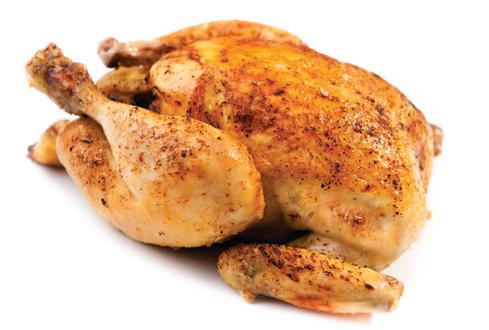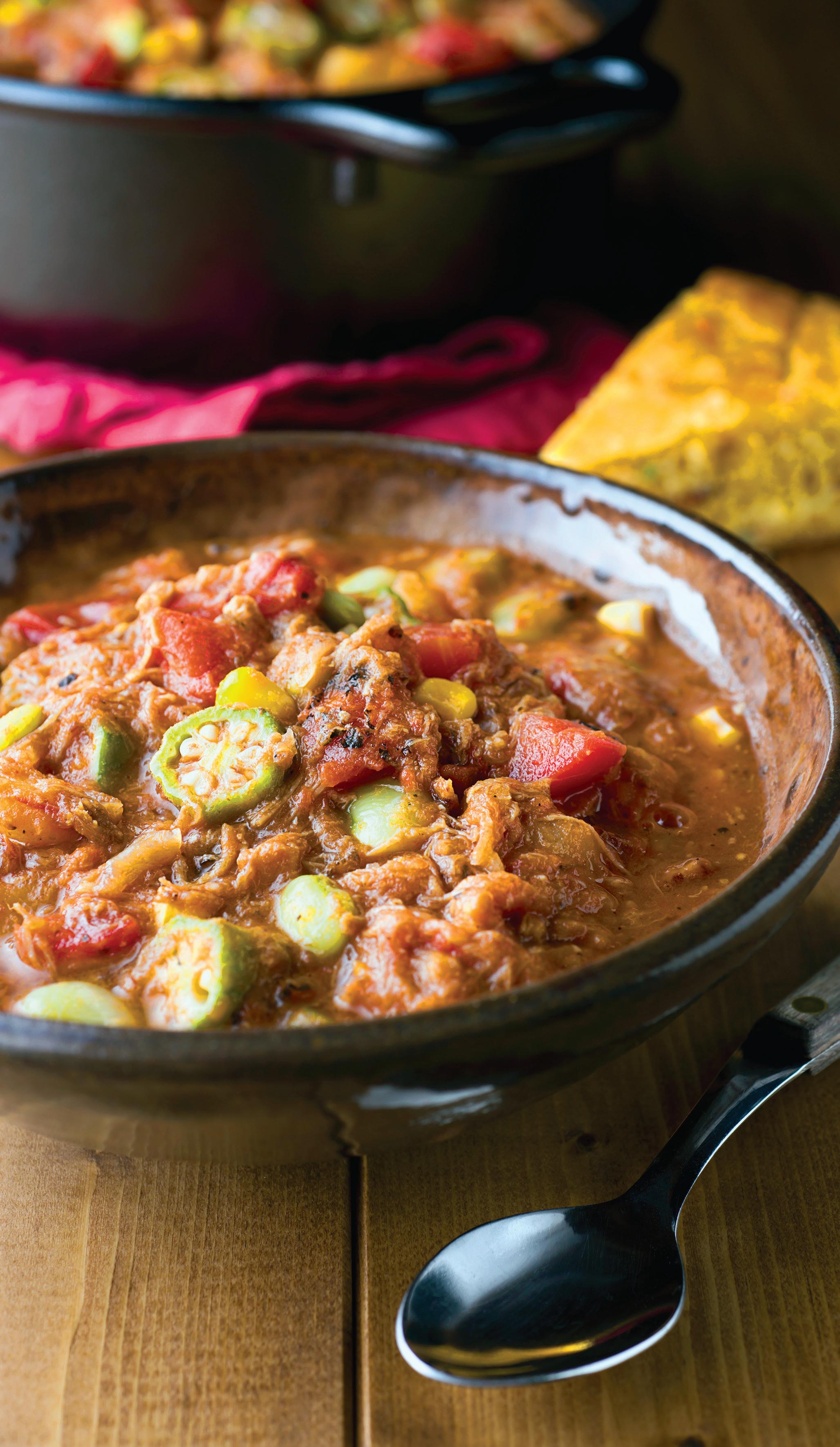
6 minute read
Heart of the Home
from FBN Nov 2020
Variations of thick Brunswick stew are easily prepared
No Virginia stew is as quintessential as Brunswick stew. It’s been part of Virginia history since it was first prepared on a hunting expedition in Brunswick County in 1828.
Advertisement
Cooking Brunswick stew is a labor of love, and often family recipes are passed down through generations. Traditionally prepared with wild game like squirrel or rabbit, variations of the thick, tomato-based stew have evolved to include chicken or pork, accompanied by vegetables like okra, lima beans, corn and potatoes.
“Everybody has their own recipe. It takes eight hours to cook ours,” said George Daniel, a stew master in Brunswick
Brunswick Stew
INGREDIENTS
4 pounds chicken ¼ cup oil ½ cup chopped onions 1 quart tomatoes 1 cup water 1 tablespoon salt 1 tablespoon Worcestershire sauce ¼ teaspoon hot pepper sauce 2 teaspoons sugar 3 cups corn 3 cups lima beans
1 cup cubed potatoes
DIRECTIONS
Flour the chicken, and in a large stock pot, sauté it in oil until light brown. Add onions, and cook until clear. Add tomatoes, water and
Chicken

Lima Beans
Potatoes County who cooks with Red Oak Stew Crew. Mixing 85 gallons at a time, Daniel and his team have won the World Championship Brunswick Stew Cook-off four or five times, he said. “You cook it until you put the paddle in the middle, and it stands up. That’s the thickness of the stew, and it’s considered done at that point.
“You can use the same ingredients, and no two people will get theirs to taste the exact same,” he added.
Daniel understandably wouldn’t reveal his team’s secret winning recipe, but we found some simple recipes that can be prepared in your kitchen—without a team of stew masters.
seasonings, and simmer until the meat is tender. Remove the chicken from the pot, and remove the bones and skin.
Return chicken to the broth, and add vegetables. Cook until the vegetables are tender. Serve hot with homemade biscuits or cornbread. -Evelyn M. Kirby, Hanover County, Country Treasures from Virginia Farm Bureau Kitchens
Brunswick Stew with a Twist
INGREDIENTS
1 large onion, chopped 1 celery rib, chopped 1 large green pepper, chopped 1 cup frozen sliced okra, thawed 4 cups frozen cubed hash browns, thawed ¾ pound barbecue pork, chopped 1 cup chopped cooked chicken ¼ tablespoon Worcestershire sauce 14.5-ounce can diced tomatoes, undrained 15-ounce can tomato sauce 15-ounce can corn with red and green peppers, drained 15.5-ounce can lima beans, drained 2 cups chicken broth ½ teaspoon salt
½ teaspoon pepper
DIRECTIONS
In a 5-quart slow cooker, combine all ingredients. Cover, and cook on high for 6½ hours. -Sarah Large, Buckingham County, Cooking Virginia Style with Farm Bureau Women
Varieties of meat, vegetables and sometimes “secret ingredients” lead to unique Brunswick stew concoctions.

Savory Brunswick Stew
INGREDIENTS
1 stewing chicken ½ tablespoon salt ½ teaspoon pepper 1-2 onions, sliced 4 potatoes, diced 1 pint tomatoes 1 pint butterbeans 1 pint corn ½ cup bread crumbs hot sauce 1 tablespoon butter or bacon drippings 1 teaspoon Worcestershire sauce
DIRECTIONS
In a large stock pot, combine chicken, salt, pepper and onion, and cover with water. Simmer until tender. Remove chicken from broth, and cool slightly. Remove bones. Add chicken, potatoes, tomatoes and beans to broth, and cook until done. Add corn, and cook for a few more minutes. Add crumbs and seasonings. -Recipe adapted from Trudy Maness, Rockbridge County, and Helen Bartenslager, Augusta County, Country Treasures from Virginia Farm Bureau Kitchens
Statement of Ownership








LEGAL
Notice of Annual Meeting
Virginia Farm Bureau Mutual Insurance Company
The annual meeting of policyholders of Virginia Farm Bureau Mutual Insurance Company will be held at 8:45 a.m., Thursday, December 17, 2020, at the Virginia Farm Bureau office, 12580 West Creek Parkway, Richmond, Virginia for the following purposes:
1. To receive and act upon the reports of the officers of the Company. 2. To elect a Board of Directors, each to serve for the term of one year. 3. To transact such other business as may properly come before the meeting or any adjournments thereof.
Dated this 1st day of October, 2020.
Kathleen M. Early, Secretary




Farm-to-retail price spread is higher than ever
BY ALICE KEMP
It’s common knowledge that COVID19 severely disrupted the food supply chain, but new information sheds light on how the pandemic widened the gap between what consumers pay at the store and what farmers receive.
According to a report by the American Farm Bureau Federation, the farm-to-retail price spread hit record levels during the pandemic— particularly for the beef and pork industries.
“If you look at the farm-to-retail price spread for beef, in June it was $5.21 per pound, and that is the highest it’s been ever since the data was collected beginning back in 1970,” said Michael Nepveux, an AFBF economist. “You see a similar story in pork. So the farm-to-retail spread for pork hit its record in June at $3.65 per pound.”
Nepveux attributes the spread to labor issues and restrictions at processing plants that created a shortage of beef and pork. Wholesale and retail prices increased, but because there was an oversupply of animals that couldn’t be processed, the prices for live animals declined.
“The record farm-to-retail price spreads for cattle and hogs in 2020 have aggravated a lot of livestock producers that produce and deliver animals to the commodity-level supply chains,” said Tony Banks, senior assistant director of agriculture, development and innovation for Virginia Farm Bureau Federation.
For example, Emily Bryant, a Botetourt County beef cattle producer, said her family farm has been adversely affected. “It would be safe to say that our operation has seen a decline of 15-20% in prices for cattle sold from late February to mid-August,” Bryant said. “We pray that we are past the worst of it. Prices have rebounded for now. The markets seem to be a little stronger.”
Bruce Stanger, a Montgomery County beef cattle farmer and member of the VFBF Livestock Advisory Committee, said he also believes the worst has passed, but it’s “a shame that we always get the short end of the stick” when it comes to prices.
“We’ve got the animals and we have to sell them, and we’re sort of at the mercy of whoever’s buying.”






